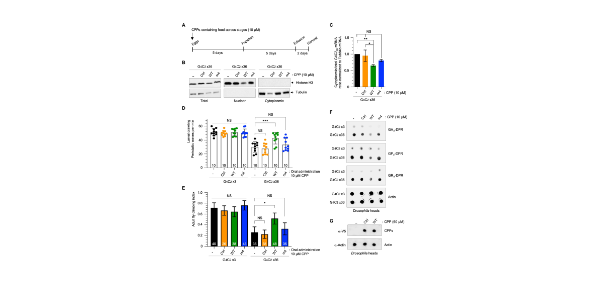
Submitted by Penny Peck on Thu, 02/03/2023 - 13:29
The most common subtypes of amyotrophic lateral sclerosis (ALS), a type of motor neurone disease, and frontotemporal dementia (FTD) is caused by a hexanucleotide expansion in C9orf72. This leads the aberrant production of dipeptide-repeat proteins that cause toxicity and neuronal cell death.
Researchers from the University of Sheffield, led by Prof. Guillaume Hautbergue, devised a cell-penetrant peptide that disrupts the nuclear export of the affected mRNA. The study, published in Science Translational Medicine, reports that this cell-penetrant peptide strategy very effectively blocks the production of the toxic dipeptide proteins in various model systems including patient-derived neurons.
Importantly, co-first author Dr Alvaro Sanchez-Martinez from Alex Whitworth’s group showed that oral administration of this compound is effective at blocking the production of dipeptides in a Drosophila (fruit fly) model of ALS/FTD. This was sufficient to prevent the neurotoxicity of the C9orf72-related dipeptides and the pathologic symptoms in this animal model. These results pave the way for developing this cell-penetrant peptide approach as a therapy for ALS/FTD.
University of Sheffield Press Release
Publication reference:
Castelli LM, Lin YH, Sanchez-Martinez A, Gül A, Mohd Imran K, Higginbottom A, Upadhyay SK, Márkus NM, Rua Martins R, Cooper-Knock J, Montmasson C, Cohen R, Walton A, Bauer CS, De Vos KJ, Mead RJ, Azzouz M, Dominguez C, Ferraiuolo L, Shaw PJ, Whitworth AJ, Hautbergue GM.
A cell-penetrant peptide blocking C9ORF72-repeat RNA nuclear export reduces the neurotoxic effects of dipeptide repeat proteins.
Sci Transl Med. 2023 Mar;15(685):eabo3823. doi: 10.1126/scitranslmed.abo3823. Epub 2023 Mar 1. PMID: 36857431.

